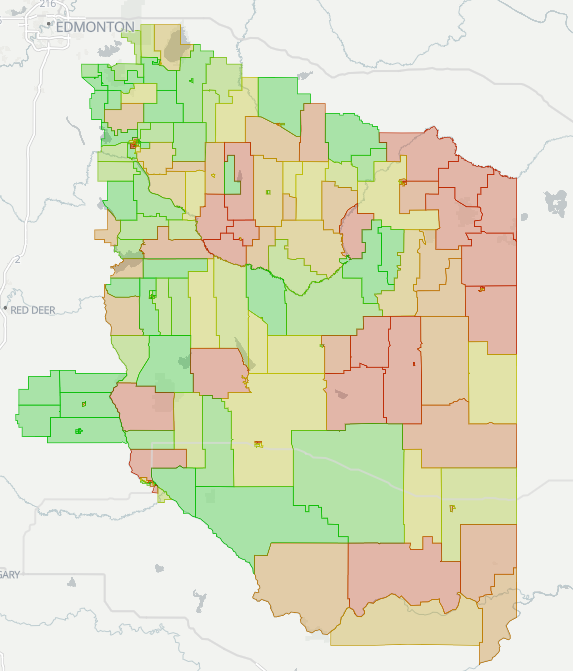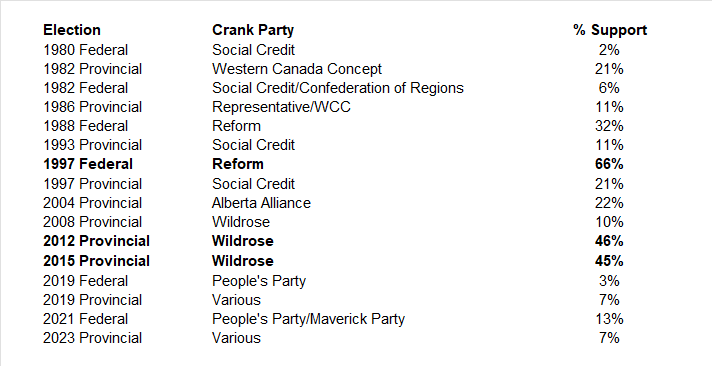No, Pierre Poilievre Isn't Going to Lose Battle River—Crowfoot
People seem intent on pretending this can be another Carleton.
For some reason, media is trying to manufacture a race in the Battle River—Crowfoot by-election.
So far I’ve seen multiple media figures and publications attempt to boost the profile of a single Independent candidate named Bonnie Critchley. The most recent is Max Fawcett in the National Observer, who talks about Critchley, concerns about separatists, and so on, so forth—but she’s also been interviewed and profiled on CBC, National Post, and the Calgary Herald (the fact the last two are Postmedia-owned as well makes it very funny).
The profiles of Critchley and others, alongside the moral panic about the Longest Ballot Committee, may just be a product of a slower summer media cycle, but that won’t stop me from disabusing folks of the notion. No, Pierre isn’t going to lose, and the chances of him even putting up a poor performance (<60%) strain credulity.
Let’s go through some of the offered scenarios one by one.
Scenario 1 - Pierre Takes Riding for Granted, Independent Gains Ground
This seems to be the one a lot of folks are all hub-bub about, rightly recognizing that the Liberal candidate is not going to come anywhere close to winning—even though, I’d argue, the chances of the Liberals putting up a good score is more likely than Critchley or someone else.
Look no further than the series of rural Western Canadian over the last decade, where the Trudeau Liberals put up 26% in nearby Medicine Hat—Cardston—Warner in a October 2016 by-election, or 35% in 2014’s Fort McMurray—Athabasca by-election. Carney’s Liberals are currently riding the crest their wave of popularity right now, so putting hopes into an Independent rather than them feels like a misreading of the current political climate.
Just for a moment however, let’s say Critchley really gains ground and becomes the ultimate non-Pierre option in the sprawling seat. She seems palatable enough to progressive voters on social issues, and it’s a by-election so party loyalty matters less. What reasonable level of support could we expect she’d take?
Well, happily independents of all strengths love running campaigns in rural Alberta, especially provincially. Let’s take a look at the recent scoreboard…
As seen, strong Independent candidates with name recognition and incumbency could barely crack 15% support in the much smaller provincial ridings. This was regardless of the year - in 2015 when conservatives in Alberta lost government for the first time in generations; 2019 when they regained support; or 2023 when there was some vulnerability and polarization. The independents were simply not a threat, and neither will the very unknown Critchley be.
It can’t even be a case of “perhaps they’ll take Conservative votes and lower Pierre’s number to an embarrassing amount!” In all those cases above, the Independent either suppressed the NDP and Alberta Party numbers, or were themselves second place in the results. None of them went under 60%, with the closest being in Brooks-Medicine Hat, where part of the riding is more urban than anything present in Battle River—Crowfoot.
Sorry gang, not gonna happen here.
Scenario 2 - Separatists or Other Cranks Get Momentum
Okay okay—what about the separatists, though? Or whatever remains of the PPC, Maverick Party (defunct), or other weirdos who tend to congregate in these areas and towards cameras?
We already know how insurgent conservative political movements fare in this region, and it isn’t well. The only time it worked in Battle River—Crowfoot (and the provincial ridings it covers) was in 2012 under Danielle Smith, back when she was Wildrose Party leader.
Prior to then, while crank conservatives in Social Credit and the Western Canada Concept posted good numbers in the area, they never came close to seriously contesting the reigning Conservative Party hegemony in the area (save for, of course, Reform federally).
Barring some serious underlying issues within the conservative movement right now, the crank parties will be lucky to reach 10-15% support in the by-election. We just barely saw some schisms happen in the far-more separatist-friendly Olds-Didsbury-Three Hills by-election - even so, the leader of the explicitly separatist Republican Party came third behind the NDP, not reaching 20% support in this low-turnout, low-stakes contest.
Meanwhile, as far as I can tell, the separatists are not fielding a candidate against Poilievre. The only explicitly pro-secession candidate is the Libertarian and another crank named Grant Abraham, and I probably don’t need to tell you they’re not going to organize seriously in rural Alberta.
Even if one does run or gain momentum, separation is not a majority opinion in the region so far as we know. According to a Janet Brown poll done in May, rural Albertans are against separation by a vote of 56-40, and 45% strongly disagree with the statement that Alberta would be better off if separated from Canada.
Simply put, those who would be animated by a separatist campaign are a minority, and they’re not likely to be motivated enough to vote against the pro-resource extraction Poilievre in a federal by-election.

Scenario 3 - Pierre Sucks, That’ll Do Him In, Just Like Carleton!
Yeah, sorry, but being a terrible person and politician just isn’t enough to cause someone to lose a seat with a 70% margin of victory for a political party. I don’t need to even point to the plentiful American examples, like Scott DesJarlais or Chuck Schumer—transphobe Jennifer Johnson lost the UCP’s endorsement mid-campaign in 2023 in her rural next-door riding to Battle River—Crowfoot, and still won 67-23 (and later joined the caucus, of course).
It barely matters in competitive seats too, as Brent Chapman showed us in 2024 in suburban Vancouver. The era of hyper-partisanship will not allow for another John Tory situation to happen.
Pierre’s Worst Case Scenario
Okay so, let’s say everything goes really wrong for Pierre. What would that realistically look like given the general averages we have for independents, crank movements, and the general party system?
Let’s get the basics out of the way - the 2025 results were:
83% Conservative
12% Liberal
3% NDP
2% PPC
1% Green
We’ll assume a couple things first: one, the NDP and Greens remain the same; two, the Liberals gain some ground, we’ll be very generous and say they gain similar to the previously mentioned 2016 Medicine Hat—Cardston—Warner by-election, where they went from 18% in the general to 26%, or a gain of 44%, which we’ll just snipe from the Conservatives.
Next, let’s add in some really good numbers for Critchley, using an average of that first chart - 11% support. Again, just take it from the Conservatives, even though she’d almost assuredly would take from the Liberals as well.
Finally, let’s put the PPC back up to their best (9%), and peel off a similar amount for a strong separatist candidate. Add on another 2% for Longest Ballot and other randos. Take another 4% out and disperse for general “we hate Pierre” folks. Where does that leave us?
Worst-Case Scenario Hypothetical (general numbers, don’t take seriously)
45% Conservative
18% Liberal
12% Critchley (Strong Ind.)
10% PPC
10% Separatist
5% NDP/Green/Other
Now, don’t get me wrong - a drop from 83% to 45% is pretty damning… but this is if everything goes wrong for Pierre: motivated opposition turnout, smaller parties organize the best they ever have in decades, people just really dislike Pierre, etc.
But it isn’t a competitive race. It’s barely a footnote of one, and this is a generous fantasy scenario. What are we doing here, folks?
Why I Wrote All This
Unfortunately I just don’t see where people are getting their hopes up, and I’ve seen it in comments on Reddit, in screenshots of social media I’ve seen, and as mentioned, in major media. My only question is: why?
We’re living in an age where factuality seems increasingly lost in a sea of deliberate misinfo and outright grift. While I’m not accusing folks here of that—especially not Max Fawcett, literally one of my favs—I am concerned about people’s inability to just deal with reality.
Pierre lost Carleton, true, but that was a competitive seat with a dedicated candidate in now-MP Fanjoy; Battle River is not. That’s plain as day for anyone to see, you just need to take a cursory glance at any datapoint, but too many are falling for constructed narratives. It seems like we crave them.
In the days of AI serving up blatantly false information just to please us, and a media landscape of both professionals and influencers throwing out anything to grab your attention, I really need people to check this stuff for themselves. I need reality to become popular again, and not treated as disposable for clicks.



